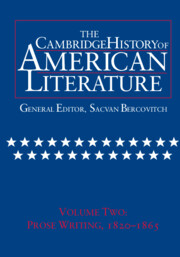Book contents
- Frontmatter
- Introduction
- CONDITIONS OF LITERARY VOCATION
- THE LITERATURE OF EXPANSION AND RACE
- THE TRANSCENDENTALISTS
- 1 Unitarian Beginnings
- 2 The Assault on Locke
- 3 Carlyle and the Beginnings of American Transcendentalism
- 4 “Annus Mirabilis”
- 5 The Establishment and the Movement
- 6 Letters and Social Aims
- 7 The Hope of Reform
- 8 Diaspora
- 9 The Antislavery Years
- NARRATIVE FORMS
- Chronology
- Bibliography
- Index
2 - The Assault on Locke
from THE TRANSCENDENTALISTS
Published online by Cambridge University Press: 28 March 2008
- Frontmatter
- Introduction
- CONDITIONS OF LITERARY VOCATION
- THE LITERATURE OF EXPANSION AND RACE
- THE TRANSCENDENTALISTS
- 1 Unitarian Beginnings
- 2 The Assault on Locke
- 3 Carlyle and the Beginnings of American Transcendentalism
- 4 “Annus Mirabilis”
- 5 The Establishment and the Movement
- 6 Letters and Social Aims
- 7 The Hope of Reform
- 8 Diaspora
- 9 The Antislavery Years
- NARRATIVE FORMS
- Chronology
- Bibliography
- Index
Summary
Toward the end of the 1820s the philosophical synthesis that had supported Unitarianism throughout its period of expansion began to show signs of strain. Unresolved contradictions within it – the tension between sensationalism and idealism in its epistemology, the mingled attitude of desire and fear that marked its dealings with German biblical criticism – began to trouble new generations of students. Writings of the English and German Romantics kept arriving on American shores and finding enthusiasts among the young, despite their elders' contempt for the bathos of Wordsworth, the licentiousness of Goethe, the obscurity of Kant and of Coleridge. Reformers were beginning to demand that the churches leave their careful doctrine of individual self-culture and do something about the scandal of urban poverty or the greater scandal of slavery. By the end of the 1820s the discontents among the younger Unitarians had begun to find public expression.
The first sign of the trouble that would later be labeled “Transcendentalism” came with an attack on two fronts: on the philosophy of John Locke and on the educational system at Harvard. The two things were naturally allied in the minds of the young men who had been subjected to them simultaneously, and the connection was reinforced by the fact that Harvard's heavy reliance on drill seemed perfectly tailored to Locke's view of the mind's structure. If the mind is an empty tablet and if all ideas come from sensation and reflection, then memorization ought to be the foundation of all learning and recitation the proper medium for its display.
- Type
- Chapter
- Information
- The Cambridge History of American Literature , pp. 350 - 361Publisher: Cambridge University PressPrint publication year: 1995

